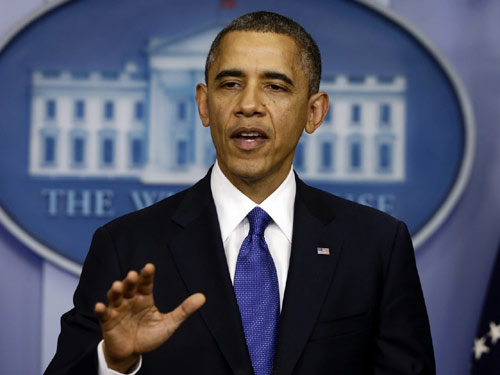
|
President Obama will formally present a new national security strategy early next year, identifying his foreign policy priorities for the remainder of his time in office, the White House said Friday. The new policy document will be the second of Obama's administration and will likely update the previous one, released in May 2010, in several important areas. Those include policies for fighting the next phase of the war against al-Qaeda, the shift of national security resources to Asia and a plan to manage declining defense budgets amid fiscal strain. The administration will present another strategy paper on how it intends to achieve the policy ambitions to be outlined in the new national security doctrine sometime in the spring, Obama told Congress in a letter made public Friday. The new strategy is being drafted at a time when Obama continues to face questions over his counterterrorism policy, particularly the use of drones in Afghanistan and Pakistan as the US military withdraws from that region. Disclosures over the scope of the National Security Agency’s eavesdropping practices have also placed Obama at odds with some foreign leaders, including US allies, and prompted him to pledge reforms in the way intelligence gathering is conducted. The new security strategy will likely reflect some of those proposals and expand on administration plans in the Asia-Pacific region as the country shifts from a war footing in the decade since the Sept. 11, 2001, terrorist attacks to new diplomatic and economic initiatives. The National Security Strategy document falls under a 1986 law requiring the president to present Congress with an annual strategic statement. Most administrations have been inconsistent in meeting that obligation. George W. Bush, for example, issued only two during his eight years in office. The policy statement sets administration priorities inside the government and communicates them to Congress, the American public and the world. It also is intended as a framework for strategy documents produced by other parts of the government, including the Pentagon’s national defense strategy. Obama’s first National Security Strategy ran 52 pages and set out a course for ending the US military involvement in Iraq. Although the strategy asserted America’s central role in the world, it also warned that “when we overuse our military might, or fail to invest in or deploy complementary tools, or act without partners, then our military is overstretched.” “Americans bear a greater burden, and our leadership around the world is too narrowly identified with military forces,” the document reads. It lists as the country's “enduring national interests” security, prosperity, values and international order. In recent months, Obama has outlined some of his foreign policy priorities for the rest of his second term, telling the UN General Assembly in September that in the Middle East he would focus on securing a nuclear agreement with Iran and peace between the Israelis and Palestinians. That emphasis will likely be reflected in the updated strategy document, which will also likely look beyond the official conclusion of US combat operations in Afghanistan at the end of 2014. |
據(jù)美國《華盛頓郵報》報道,白宮11月29號稱,奧巴馬總統(tǒng)將于2014年初正式呈報一份新的《新國家安全戰(zhàn)略》,明確他在位所剩時間內(nèi)外交政策的重點。 這份新的政策文件將會是奧巴馬政府發(fā)布的第二份此類文件,在幾個重要問題上很可能是第一份(發(fā)布于2010年5月份)的修改版。這些重要問題涵蓋下一個階段同基地組織之間的戰(zhàn)爭、向亞洲轉(zhuǎn)移國家安全資源以及在財政壓力下管理縮減的國防預(yù)算計劃。 在11月29日公布的一份信件中,奧巴馬告訴國會,其政府將于2014年春季呈報另一份戰(zhàn)略文件,文件將詳述如何實現(xiàn)在《新國家安全戰(zhàn)略》中提出的政策目標(biāo)。 奧巴馬擬定這份政策文件的同時,也正是面臨外界對他反恐政策的質(zhì)疑,特別是隨著美國軍隊從阿富汗和巴基斯坦撤軍,美國在這些地方使用無人飛機(jī)事件。 美國國家安全局竊聽對象行為的范圍遭披露后,奧巴馬也與包括美國盟友在內(nèi)的一些外國領(lǐng)導(dǎo)者產(chǎn)生了分歧,這促使他承諾改革信息情報收集方式。 2001年9月11日恐怖襲擊事件讓美國在隨后的十年內(nèi)都處于戰(zhàn)備狀態(tài),隨著美國從戰(zhàn)備狀態(tài)轉(zhuǎn)入新外交和經(jīng)濟(jì)提案,《新國家安全戰(zhàn)略》很可能會體現(xiàn)這些提案中的某些舉措,并詳述政府在亞太地區(qū)的計劃。 《國家安全戰(zhàn)略》是根據(jù)1986年的一部法律制訂的。該法律要求美國總統(tǒng)必須每年呈報給國會一份年度政策聲明。幾乎各屆政府都沒履行這項職責(zé)。比如喬治·W·布什總統(tǒng)在位八年就只發(fā)布兩份。 政策聲明為政府內(nèi)部劃定施政重點,并把這些重點傳達(dá)給國會、美國民眾以及整個世界。這項政策聲明也能作為其他政府部門擬定的政策文件框架,包括五角大樓國防戰(zhàn)略。 奧巴馬第一份《國家安全戰(zhàn)略》總共52頁,里面闡明美國結(jié)束軍事介入伊拉克的過程。 雖然該戰(zhàn)略宣稱美國在世界扮演核心角色,同時也提醒“我們?nèi)羰菫E用軍事力量,或是無力投資或部署輔助性工具,亦或者沒有協(xié)同盟友單獨行動的話,那我們軍隊?wèi)?zhàn)線就太長了”。 文件還寫道:“(那樣的話)美國就會承受更大的壓力,如果把我們在世界范圍的領(lǐng)導(dǎo)等同于軍事力量領(lǐng)導(dǎo),那就太狹隘了。”文件羅列出美國“經(jīng)久不衰的國家利益”:安全、繁榮、價值觀和國際秩序。 最近幾個月,奧巴馬擬出連任期剩下這段時間內(nèi)他的外交政策重點。在九月份召開的聯(lián)合國大會上,奧巴馬稱他將把重點放在和伊朗達(dá)成核協(xié)議、以及與以色列人和巴基斯坦人達(dá)成和平協(xié)議上。 他強(qiáng)調(diào)的這些重點很有可能出現(xiàn)在修改版的《新國家安全戰(zhàn)略》。這份新戰(zhàn)略也有望涵蓋2014年底在阿富汗正式結(jié)束美國作戰(zhàn)行動的相關(guān)事宜。 (譯者 榆木柯 編輯 丹妮) |
